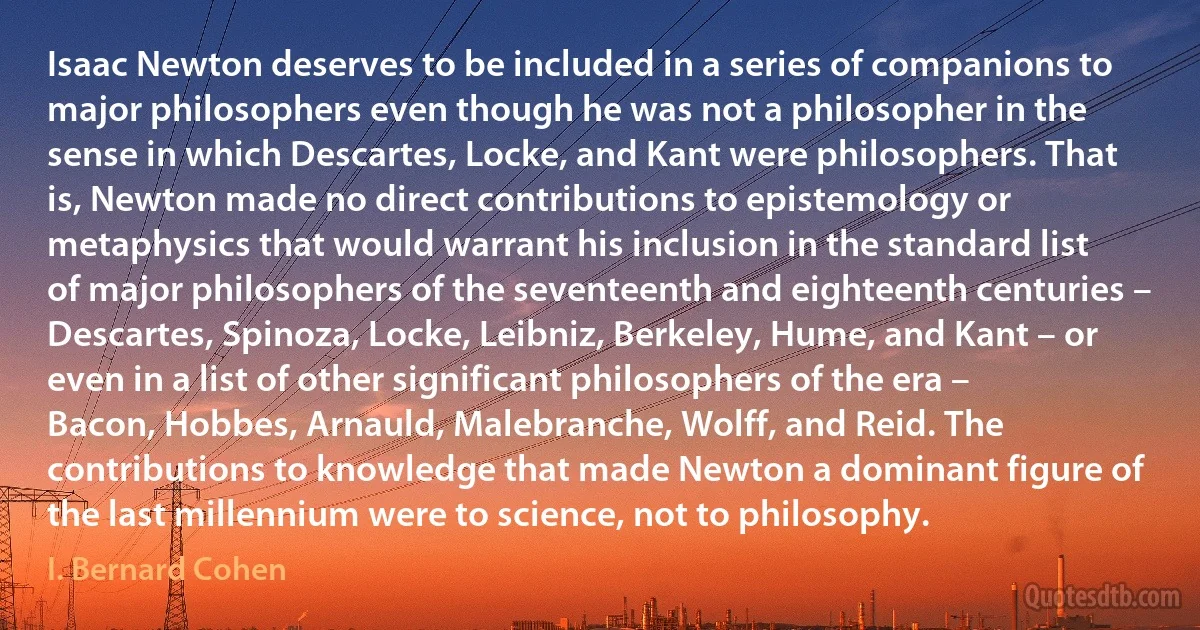
Isaac Newton deserves to be included in a series of companions to major philosophers even though he was not a philosopher in the sense in which Descartes, Locke, and Kant were philosophers. That is, Newton made no direct contributions to epistemology or metaphysics that would warrant his inclusion in the standard list of major philosophers of the seventeenth and eighteenth centuries – Descartes, Spinoza, Locke, Leibniz, Berkeley, Hume, and Kant – or even in a list of other significant philosophers of the era – Bacon, Hobbes, Arnauld, Malebranche, Wolff, and Reid. The contributions to knowledge that made Newton a dominant figure of the last millennium were to science, not to philosophy.
I. Bernard CohenRelated topics
bacon dominant eighteenth epistemology era inclusion knowledge last metaphysics millennium science sense series seventeenth significant locke kant berkeley leibniz newton reid descartes hobbes hume isaacRelated quotes
If the water flow down by a gradual natural channel, its potential energy is gradually converted into heat by fluid friction, according to an admirable discovery made by Mr Joule of Manchester above twelve years ago, which has led to the greatest reform that physical science has experienced since the days of Newton. From that discovery, it may be concluded with certainty that heat is not matter, but some kind of motion among the particles of matter; a conclusion established, it is true, by Sir Humphrey Davy and Count Rumford at the end of last century, but ignored by even the highest scientific men during a period of more than forty years.

William Thomson
The purpose of the State is, as we have already shown in our last lecture, no other than that of the Human Race itself:-to order all its relations according to the Laws of Reason. It is only after the Age of Reason as Science shall have been traversed, and we shall have arrived at the Age of Reason as Art, that the State can reflect upon this purpose with clear consciousness. Till then it constantly promotes this purpose, but without its own knowledge, or free pre meditated design; prompted thereto by the natural law of the development of our Race, even while it has a totally different purpose in view;-with which purpose of its own, Nature has indissolubly bound up the purpose of the whole Race.

Johann Gottlieb Fichte
An occasion such as this which has brought us here can not but direct our consideration to these things. It has been a painful and difficult experience, this by which another race has been recruited to the standard of civilization and enlightenment; for that is really what has been going on; and the episodes of Negro slavery in America, of civil war, and emancipation, and, following that, the rapid advancement of the American colored people both materially and spiritually, must be recognized as parts of a long evolution by which all mankind is gradually being led to higher levels, expanding its understanding of its mission here, approaching nearer and nearer to the realization of its full and perfected destiny.

Calvin Coolidge
Let true Christians then, with becoming earnestness, strive in all things to recommend their profession, and to put to silence the vain scoffs of ignorant objectors. Let them boldly assert the cause of Christ in an age when so many, who bear the name of Christians, are ashamed of Him: and let them consider as devolved on Them the important duty of suspending for a while the fall of their country, and, perhaps, of performing a still more extensive service to society at large; not by busy interference in politics, in which it cannot but be confessed there is much uncertainty; but rather by that sure and radical benefit of restoring the influence of Religion, and of raising the standard of morality.

William Wilberforce
It is significant that the Great Teacher does not draw up a code of laws or list or sins. Nowhere does Jesus say explicitly that human slavery is a sin, or that the employment of little children for fourteen hours a day in a factory is a sin. He deals in general principles concerning the great fundamentals of life. So clear is his teaching, however, that there can be no doubt as to what he thinks of human slavery or the oppression of little children. In the teaching of Jesus, life is relationship, dwelling on friendly and affectionate terms with God, with ourselves, and with our fellowmen. Anything which destroys this relationship is sin. By this standard any thought or act may safely be judged.

Kirby Page
